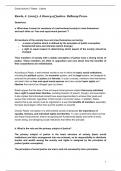Guide lecture 5- Rawls - Liberty
Rawls, J. (2005). A theory of justice. Belknap Press.
Questions:
a. What does it mean for members of a well-ordered society to view themselves
and each other as “free and equal moral persons”?
All members of the society have and view themselves as having:
- a sense of justice which is defined by the principles of public conception.
- fundamental aims and interests (which diverge)
- a right to equal respect in determining which aspect of the society should be
changed
Thus members of society with a stable conception of justice have a strong sense of
justice. These members are often in opposition and care about how the benefits of
their corporations are redistributed.
According to Rawls, a well-ordered society is one in which the basic social institutions,
including the political system, the economic system, and the legal system, are designed to
promote the principles of justice and fairness. In such a society, members view themselves
and each other as free and equal moral persons who have certain basic rights and
liberties that cannot be infringed upon by others.
Rawls argues that the idea of free and equal moral persons implies that every individual
has a right to equal basic liberties, including freedom of speech, thought, and association.
It also implies that individuals should have equal opportunities to achieve their goals and
pursue their interests, regardless of their social or economic status. In addition, Rawls
asserts that a just society must be organized in a way that benefits all members, especially
the least advantaged, rather than just the wealthy or powerful.
Overall, Rawls' conception of a well-ordered society emphasizes the importance of
equality, fairness, and individual rights and liberties. To view oneself and others as free
and equal moral persons means recognizing the fundamental dignity and worth of every
human being, and designing social institutions that reflect this principle.
b. What is the role and the primary subject of justice?
The primary subject of justice is the basic structure of society (basic social
institutions and their arrangement into one scheme), as its responsibility to distribute
burden and wealth among the society and rights is assigned by the principles of
justice (public conception).
The principles of social justice are macro and not necessarily micro principles.
1
, Guide lecture 5- Rawls - Liberty
Rawls argues that the primary subject of justice is the basic structure of society, which
includes its political, economic, and legal institutions. The role of justice is to ensure that this
basic structure is designed and organized in a way that promotes the well-being and equality
of all members of society.
Rawls asserts that the basic structure of society plays a crucial role in shaping the
opportunities and life chances of individuals, and therefore, it must be organized in a way
that is fair and just. He contends that a just society must ensure that everyone has access to
the basic goods and resources they need to lead a fulfilling life, such as healthcare,
education, and employment opportunities.
According to Rawls, justice requires that society be organized in a way that benefits all
members, especially the least advantaged. He proposes the difference principle, which
states that inequalities in society should be arranged to benefit the least advantaged, as a
fundamental principle of justice. Rawls argues that a just society must ensure that everyone
has equal access to opportunities and that the distribution of resources and benefits is based
on merit and need rather than on arbitrary factors such as race or social class.
Overall, Rawls views the role of justice as ensuring that the basic structure of society is
organized in a way that promotes the well-being and equality of all members. The primary
subject of justice is the basic structure of society, including its political, economic, and legal
institutions, which must be designed and organized in a way that reflects the principles of
fairness and equality.
c. How does Rawls propose to make the original position “fair” among the
individual contracting parties?
Raise a question: “Which conception of justice is most appropriate for a well-ordered
society?
The original position is a hypothetical state where individuals come together to make
decisions about the basic structure of society without knowing their own social position,
wealth, talents, or abilities. The individuals are placed behind a "veil of ignorance," where
they are unaware of their own specific characteristics or social position, and they have equal
bargaining power.
Rawls argues that the original position ensures fairness by placing all individuals on an equal
footing and removing any advantage or disadvantage that may come from differences in
social or economic status. Since no one knows their own particular situation, everyone is
motivated to make decisions that are in the best interests of all members of society, rather
than just themselves.
To further ensure fairness, Rawls proposes the two principles of justice, namely the liberty
principle and the difference principle, as the basis for decision-making in the original
position. The liberty principle guarantees basic individual liberties and rights, while the
difference principle states that any inequalities in society must be arranged to benefit the
least advantaged.
2





